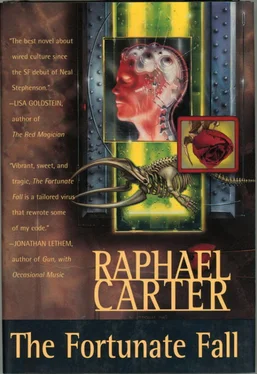Raphael Carter - The Fortunate Fall
Здесь есть возможность читать онлайн «Raphael Carter - The Fortunate Fall» весь текст электронной книги совершенно бесплатно (целиком полную версию без сокращений). В некоторых случаях можно слушать аудио, скачать через торрент в формате fb2 и присутствует краткое содержание. Город: New York, Год выпуска: 1996, ISBN: 1996, Издательство: Tor Books, Жанр: Киберпанк, на английском языке. Описание произведения, (предисловие) а так же отзывы посетителей доступны на портале библиотеки ЛибКат.
- Название:The Fortunate Fall
- Автор:
- Издательство:Tor Books
- Жанр:
- Год:1996
- Город:New York
- ISBN:0-312-86034-X
- Рейтинг книги:3 / 5. Голосов: 1
-
Избранное:Добавить в избранное
- Отзывы:
-
Ваша оценка:
- 60
- 1
- 2
- 3
- 4
- 5
The Fortunate Fall: краткое содержание, описание и аннотация
Предлагаем к чтению аннотацию, описание, краткое содержание или предисловие (зависит от того, что написал сам автор книги «The Fortunate Fall»). Если вы не нашли необходимую информацию о книге — напишите в комментариях, мы постараемся отыскать её.
“Gripping…. One of the most promising SF debuts in recent years”.
—“Publisher’s Weekly” starred review
The Fortunate Fall — читать онлайн бесплатно полную книгу (весь текст) целиком
Ниже представлен текст книги, разбитый по страницам. Система сохранения места последней прочитанной страницы, позволяет с удобством читать онлайн бесплатно книгу «The Fortunate Fall», без необходимости каждый раз заново искать на чём Вы остановились. Поставьте закладку, и сможете в любой момент перейти на страницу, на которой закончили чтение.
Интервал:
Закладка:
“As the days passed, her shock faded into a seraphic calm that, in her, was profoundly unwholesome. When they came to arrest us, her only comment was, ‘It’s about time, loves.’
“‘Tell them the truth, Katya,’ I said. ‘I’m the dissident, she’s innocent—my God, this is the Heptarch’s daughter!’
“‘Don’t tell lies, Pavel,” Katya said in a false Russian accent that only a Guardian could have believed. ‘They’d only find it out, and it would go worse for us in the end. I am Katya Andropova, no relation to the Heptarch. Let’s get it over with.”
“Then we were at Square-Mile-on-Volga, in a holding area thrown together out of barbed wire, along with thousands of others. They didn’t know it was we who had raided the camp; they were just rounding up every dissident they could track down, on the slightest rumor. We would stay in the enclosure for a time, and then when the camp had recovered from the fire, we would be processed.
“‘Maybe some of us will be let go—maybe you, ’ I said. ‘Look at all these people. There’s not room to keep more than a few.’
“‘You see that column of black smoke, from behind the hill?’ Katya said quietly.
“‘Yes,’ I said, craning my neck. ‘What is it?’
“‘Room.’
“On the evening of that day, our first, Piotr arrived, and rounded up enough of our tribe to get a good groupthink going. Piotr had read Gandhi, and understood him about as well as Piotr ever understood anything, so he thought it would be a capital idea to try out some passive resistance on the Guardians. He suggested that as a start they refuse to eat their dinner, as a token of resistance, and also because it was likely to contain meat. Now, Katya had not managed to make all of our group into vegetarians; but even those that weren’t cheerily acceded. A principle not important enough to eat cabbage for had become important enough to die for, just because it might irritate the fellows with the guns. I tried to tell them that passive resistance was only useful when you had reason to suspect your enemy possessed a conscience. I described the terminal isolation cells, and asked them whether they thought that men who could do such a thing would be swayed by children who didn’t want to eat their food. It didn’t help. I appealed to Katya, but she only said, ‘Let them do what makes them feel better; it’s all the same in the end.’
“When dinner came—a ladleful of thin soup in a tin bowl, as we squatted in the dust—the guards noticed that Piotr and his followers were not eating. They found this singularly funny. ‘It looks nasty now,’ one said, ‘but a week from now you’d eat it if I pissed in it.’
“Piotr stood up and gave his little speech; the guards roared. ‘I tell you what,’ one of them said. ‘You’re going to eat your soup, and if one of you leaves one drop we’ll shoot you down to the last man.’ Rifles were leveled. Piotr’s little band of Gandhis still refused. Here and there a knee was trembling, but their jaws were set. They were magnificent, as a bull charging a wall is magnificent; I had to admire their courage, even as I regretted their stupidity.
“Then a miracle happened. The Guardians put down their guns and looked at each other sheepishly. Then they started frisking Piotr and his people, taking all their personal effects and spare change. Passive resistance had made killers into pickpockets.
“‘It worked,’ I said in amazement. ‘They won.’
“‘No, they didn’t,’ Katya said gently. ‘They did something unexpected, and Guardians can’t handle the unexpected. But they’ll find some way to pump up their courage, and then finish what they started. Piotr’s people will be dead soon, and the sooner, the better for them. Eat your soup now, Pavel, before they come for us too.’
“If she had not commanded it, I don’t think I could have managed. It seems so ridiculous now; the animals were already dead, and besides, we had killed men, and besides, the Guardians weren’t likely to waste meat on the likes of us. If that slop had a connection to any bleeding thing, it was only some microscopic globule of anonymous hydrocarbons. But at the time, it was as though I dismembered the deer with my own hands, and sank my teeth into its throat. Because it was then that I knew I was a traitor to the bone. I would betray everything I believed in, simply to survive another day. It was the great lesson of the camps, and I was fortunate to learn it so soon. That saved me trouble in the end.
“Then, a disaster. One of the guards who had been frisking prisoners for nickels and kopeks came over to us. ‘You, too, sister,’ he said. ‘Stand up.’ And he put his hands on her.
“‘Is this the only way you can get a girl to look at you, poor thing?’ she said.
“He ignored her, but blood rose into his cheeks. He found the flask strapped to her thigh, reached into her pants to take it out— I could have cut off that hand without regret—opened it and sniffed it. A smile curled his features. ‘You’ll need it where you’re going,’ he said. ‘Too bad it’s not allowed.’ And he poured the flask out in front of her and crushed it under his heel. Then he moved on to me.
“We exchanged looks of panic as his hands touched my shoulders. In desperation she burst out: ‘Now do you like the boys better, Johnny, or is it just because the girls all laugh at you?’
“He hit her across the face with his closed fist. Then, his anger still building, he took out his pistol, held it to her forehead, and cocked it. She stared back at him unafraid.
“At last his face twisted into a smile again, and he drew the gun away. ‘Live then,’ he said. ‘It’s so much worse.’ And he walked away laughing. Katya was bruised, bleeding—but all was not lost. I still had my flask.
“‘Guardians! They’re not even a challenge,’ she said lightly, touching the bruise on her face. ‘Their petty fears, as like as peas. Don’t worry, Pavel, we can share the one.’
“‘But whoever does it first might drop the flask.’
“‘Well then, one of us will have to do the other.’
“I looked at her and thought of what I would have to do. ‘Katya, I can’t,’ I said. ‘I’m sorry. I should be able to. But I can’t hurt you.’
“She snorted. ‘I didn’t mean you, silly. Give me the flask, I’ll hold it.’
“And as I handed over the flask I was wearing, every thought I had ever had about what might have been with her, every daydream of house and children and every furtive nocturnal imagining—all that she had labeled ‘the fence thing’—folded into nothingness. If she had felt for me what I felt for her, she could never have said that so calmly. It was necessary, there was no question of that. They could have tapped into our sockets and found out everything we knew, which might put dozens of people in Square Miles who would otherwise be free. Even killing ourselves might not help; it was rumored that the Guardians could suck the thoughts from a brain three hours dead. And if we were taken alive, we could be made puppets of the Guardians—so rumor said—our wills extinguished by the sockets, or perhaps remaining, watching what they made us do. We had to do it. But I could not do it to her; and she could to me. She did not love me. If she had ever loved anyone it was, perhaps, the man whose head she had beaten in with a steel bar.
“‘Go ahead and do it now,’ I said. ‘I’m ready.’
“‘Are you sure?’ she asked.
“‘Yes.’
“We uncapped our sockets. The night before we raided the camp, we had carefully dissected them, taken out the linings, and broken the water-locks, in preparation.
“‘I wish I had never met you,’ she said, ‘so it wouldn’t have come to this. I care for you a great deal, Pavel.’
Читать дальшеИнтервал:
Закладка:
Похожие книги на «The Fortunate Fall»
Представляем Вашему вниманию похожие книги на «The Fortunate Fall» списком для выбора. Мы отобрали схожую по названию и смыслу литературу в надежде предоставить читателям больше вариантов отыскать новые, интересные, ещё непрочитанные произведения.
Обсуждение, отзывы о книге «The Fortunate Fall» и просто собственные мнения читателей. Оставьте ваши комментарии, напишите, что Вы думаете о произведении, его смысле или главных героях. Укажите что конкретно понравилось, а что нет, и почему Вы так считаете.












